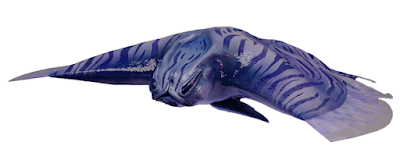My name is Richard Clarke. I serve as the Laboratory Coordinator for all of BIO 181—that’s about 70 sections this semester— and have been working with Dreamscape Learn since 2021. With the semester starting up, I thought I would share with you a little about what has been going on in the largest class in SOLS.
In the Fall of 2022 we officially transitioned to a whole new curriculum in the laboratory for BIO 181. This new modality brings together sound pedagogy with recent technological innovations in the form of virtual reality.
Dreamscape Learn BIO 181 species pictured: Astelar
In the Fall of 2022 we officially transitioned to a whole new curriculum in the laboratory for BIO 181. This new modality brings together sound pedagogy with recent technological innovations in the form of virtual reality.

Dreamscape Learn BIO 181 species pictured: Astelar
As part of this new curriculum, students will be able to don a headset and navigate around the Intergalactic Wildlife Federation. Here they will be encountering novel species and help to uncover why some of the species are suffering: exploring the relationship between environmental conditions and survival rates of the astelars; investigating the pathological features of the disease responsible for a spike in mortality of the spotted glider; and discovering why the resident alpha, Xor, is leading her herd awry.
Throughout their journey students will be developing their quantitative analysis skills and honing their qualitative thinking in order to prepare them for whichever STEM discipline they choose to follow. The curriculum has been designed to provide a base of generalized skills that can be applied to any specific field the student is interested in.

From Dreamscape Learn BIO 181, meet Xor, the Megaraffe.
From Dreamscape Learn BIO 181, meet Xor, the Megaraffe.
During this transition we also really looked at how we could better support our students in the laboratory. From there, a small team developed a model to help prepare TA’s to be a more active agent in the learning process with students. Gone are the days of a passive “sage on the stage” We are now working with a cohort of TAs and instructional staff to really engage the students. Much of the instructional practice has been adapted from Doug Lemov’s Teach Like a Champ.
In this seminal work, Lemov outlines sixty-three techniques to help students learn. While, there is not enough time to train our TA’s in every technique, we have pulled the most salient strategies that we felt would best serve our student body. One of the most powerful techniques is that of cold calling.
“The practice of calling on students regardless of whether they have raised their hand…” Lemov goes on to describe this practice as a “…profoundly important technique that can elicit a chain of surprising and positive effects in the classroom.”
However, I’m sure you can all think back to sitting at your desk in grade school. Your teacher is lecturing on a topic that is not very interesting to the class as a whole and one of your peers has dozed off in the corner. Your teacher then firmly asks that sleepy student a question relating to their lecture, unfortunately, the student doesn’t know the answer. Cold calling has historically been used punitively and as a tool to embarrass students. As such, it is a very challenging technique to get TAs to use as they all remember how they felt in those scenarios, whether they were the observer or the sleepy student.
The truth is, cold calling can be used to ascertain what a student does and does not know. It allows a trained educator to determine where they need to support a student’s learning or pivot how they present material. More than that, particularly in a college setting, we have found that being able to look at and name a student, thereby validating and acknowledging their existence, has a profound effect on their social-emotional well-being as well as inculcating a supportive environment in the classroom.

From BIO 181's Intergalactic Wildlife Federation, a Spotted Glider.
These are just a few of the developments we have been making in the BIO 181 sphere. We are on the right track to giving each student the tools they need to succeed in their chosen STEM field here at ASU.
These are just a few of the developments we have been making in the BIO 181 sphere. We are on the right track to giving each student the tools they need to succeed in their chosen STEM field here at ASU.
Post Author
Richard Clarke is the Laboratory Coordinator for the BIO 181 courses in SOLS. Richard has served in this role since the pilot of DSL. He is a three-time ASU alumnus having received degrees in Secondary Education, Biochemistry, and Biology.

Comments
Post a Comment